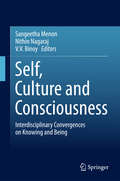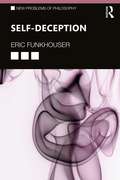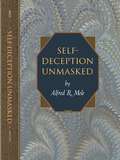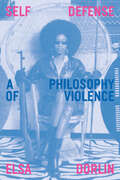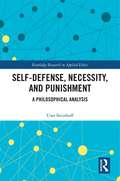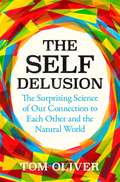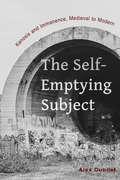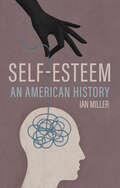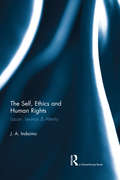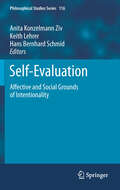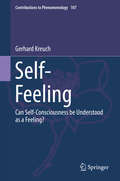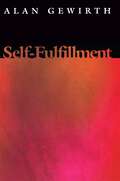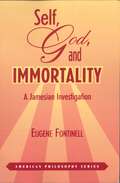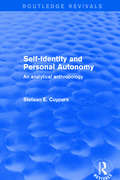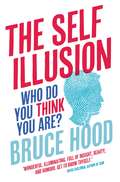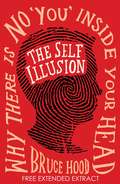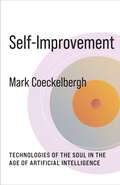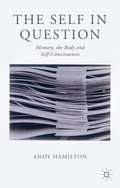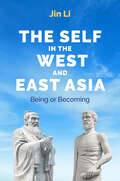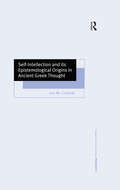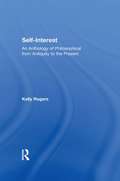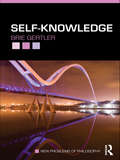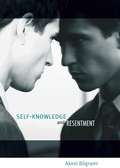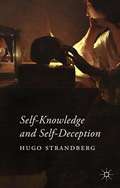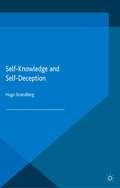- Table View
- List View
Self, Culture and Consciousness: Interdisciplinary Convergences On Knowing And Being
by Sangeetha Menon Nithin Nagaraj V. V. BinoyThis volume brings together the primary challenges for 21st century cognitive sciences and cultural neuroscience in responding to the nature of human identity, self, and evolution of life itself. Through chapters devoted to intricate but focused models, empirical findings, theories, and experiential data, the contributors reflect upon the most exciting possibilities, and debate upon the fundamental aspects of consciousness and self in the context of cultural, philosophical, and multidisciplinary divergences and convergences. Such an understanding and the ensuing insights lie in the cusp of philosophy, neurosciences, psychiatry, and medical humanities. In this volume, the editors and contributors explore the foundations of human thinking and being and discuss both evolutionary/cultural embeddedness, and the self-orientation, of consciousness, keeping in mind questions that bring in the interdisciplinary complexity of issues such as the emergence of consciousness, relation between healing and agency, models of altered self, how cognition impacts the social self, experiential primacy as the hallmark of consciousness, and alternate epistemologies to understand these interdisciplinary puzzles.
Self-Deception (New Problems of Philosophy)
by Eric FunkhouserSelf-deception poses longstanding and fascinating paradoxes. Philosophers have questioned whether, and how, self-deception is even possible; evolutionary theorists have debated whether it is adaptive. For Sigmund Freud self-deception was a fundamental key to understanding the unconscious, and from The Bible to The Great Gatsby literature abounds with characters renowned for their self-deception. But what exactly is self-deception? Why is it so puzzling? How is it performed? And is it harmful? In this thorough and clearly written introduction to the philosophy and psychology of self-deception, Eric Funkhouser examines and assesses these questions and more: Clarification of the conceptual background and "Basic problem" of self-deception, including Freud and Davidson and the important debate between intentionalists and motivationalists Deflationary accounts that appeal to cognitive and motivational biases, with emphasis on how motives and emotions drive self-deception Intentional self-deception and the "divided mind," including the role of the unconscious in recent psychological research Challenges that self-deception poses for philosophy of mind and psychology, especially for our understanding of intention, belief, and deception Biology and moral psychology of self-deception: Is self-deception functional or beneficial? Are the self-deceived to be held accountable? Combining philosophical analysis with the latest psychological research, and including features such as chapter summaries, annotated recommended reading and a glossary, Self-Deception is an excellent resource for students of philosophy of mind and psychology, moral psychology and ethics, as well as those in related fields such as psychology and cognitive science.
Self-Deception Unmasked (Princeton Monographs in Philosophy #6)
by Alfred R. MeleSelf-deception raises complex questions about the nature of belief and the structure of the human mind. In this book, Alfred Mele addresses four of the most critical of these questions: What is it to deceive oneself? How do we deceive ourselves? Why do we deceive ourselves? Is self-deception really possible? Drawing on cutting-edge empirical research on everyday reasoning and biases, Mele takes issue with commonplace attempts to equate the processes of self-deception with those of stereotypical interpersonal deception. Such attempts, he demonstrates, are fundamentally misguided, particularly in the assumption that self-deception is intentional. In their place, Mele proposes a compelling, empirically informed account of the motivational causes of biased beliefs. At the heart of this theory is an appreciation of how emotion and motivation may, without our knowing it, bias our assessment of evidence for beliefs. Highlighting motivation and emotion, Mele develops a pair of approaches for explaining the two forms of self-deception: the "straight" form, in which we believe what we want to be true, and the "twisted" form, in which we believe what we wish to be false. Underlying Mele's work is an abiding interest in understanding and explaining the behavior of real human beings. The result is a comprehensive, elegant, empirically grounded theory of everyday self-deception that should engage philosophers and social scientists alike.
Self Defense: A Philosophy of Violence
by Elsa DorlinA brilliant study of violent self-defense in the struggle for liberation by an award-winning philosopherIs violent self-defense ethical? In the history of colonialism, racism, sexism, capitalism, there has long been a dividing line between bodies "worthy of defending" and those who have been disarmed and rendered defenseless. In 1685, for example, France's infamous "Code Noir" forbade slaves from carrying weapons, under penalty of the whip. In nineteenth-century Algeria, the colonial state outlawed the use of arms by Algerians, but granted French settlers the right to bear arms. Today, some lives are seen to be worth so little that Black teenagers can be shot in the back for appearing "threatening" while their killers are understood, by the state, to be justified. That those subject to the most violence have been forcibly made defenseless raises, for any movement of liberation, the question of using violence in the interest of self-defense.Here, philosopher Elsa Dorlin looks across the global history of the left - from slave revolts to the knitting women of the French Revolution and British suffragists' training in ju-jitsu, from the Warsaw Ghetto Uprising to the Black Panther Party, from queer neighborhood patrols to Black Lives Matter, to trace the politics, philosophy, and ethics of self defense. In this history she finds a "martial ethics of the self": a practice in which violent self defense is the only means for the oppressed to ensure survival and to build a liveable future. In this sparkling and provocative book, drawing on theorists from Thomas Hobbes to Fred Hampton, Frantz Fanon to Judith Butler, Michel Foucault to June Jordan, Dorlin has reworked the very idea of modern governance and political subjectivity.Translated from the French by Kieran Aarons.
Self-Defense, Necessity, and Punishment: A Philosophical Analysis (Routledge Research in Applied Ethics)
by Uwe SteinhoffThis book offers a philosophical analysis of the moral and legal justifications for the use of force. While the book focuses on the ethics self-defense, it also explores its relation to lesser evil justifications, public authority, the justification of punishment, and the ethics of war. Steinhoff’s account of the moral use of force covers a wide range of topics, including the nature of justification in general, the precise elements of different justifications, the logic of claim- and liberty-rights and of rights forfeiture, the value of human life and its limits, and the princples of reciprocity and precaution. While the author’s analysis is primarily philosophical, it is informed by a metaethical stance that also places heavy emphasis on existing law and legal scholarship. In doing so, the book appeals to widely shared moral intuitions, precepts, and concepts grounded in criminal law. Self-Defense, Necessity, and Punishment offers the most comprehensive and systematic account of the ethics of self-defense. It will be of interest to scholars and graduate students working in applied ethics and moral philosophy, philosophy of law, and political philosophy.
The Self Delusion: The Surprising Science of Our Connection to Each Other and the Natural World
by Tom Oliver'A thought-provoking and worthwhile read' THE TIMES'A timely, challenging book' GUARDIAN'[A] rich, intriguing book' NATUREWE ARE MUCH MORE CONNECTED TO NATURE AND EACH OTHER THAN WE REALISE . . . - Most of our 37 trillion cells have such a short lifespan that we are essentially made anew every few weeks- The molecules forming our bodies have been component parts of countless other organisms, from ancient plants to dinosaurs- The bacteria, fungi and viruses that make up our bodies influence our moods and even manipulate our behaviour- Every word and every touch we receive from other people transforms the neural networks in our brain and changes our sense of self THE SELF DELUSION is an explosive, powerful and inspiring book that brings together overwhelming evidence against the illusion we have of ourselves as independent beings - and explains how understanding our many connections may be the key to a better future.
The Self-Emptying Subject: Kenosis and Immanence, Medieval to Modern
by Alex DubiletAgainst the two dominant ethical paradigms of continental philosophy–Emmanuel Levinas’s ethics of the Other and Michel Foucault’s ethics of self-cultivation—The Self-Emptying Subject theorizes an ethics of self-emptying, or kenosis, that reveals the immanence of an impersonal and dispossessed life “without a why.” Rather than aligning immanence with the enclosures of the subject, The Self-Emptying Subject engages the history of Christian mystical theology, modern philosophy, and contemporary theories of the subject to rethink immanence as what precedes and exceeds the very difference between the (human) self and the (divine) other, between the subject and transcendence. By arguing that transcendence operates and subjects life in secular no less than in religious domains, this book challenges the dominant distribution of concepts in contemporary theoretical discourse, which insists on associating transcendence exclusively with religion and theology and immanence exclusively with modern secularity and philosophy.The Self-Emptying Subject argues that it is important to resist framing the relationship between medieval theology and modern philosophy as a transition from the affirmation of divine transcendence to the establishment of autonomous subjects. Through an engagement with Meister Eckhart, G.W.F. Hegel, and Georges Bataille, it uncovers a medieval theological discourse that rejects the primacy of pious subjects and the transcendence of God (Eckhart); retrieves a modern philosophical discourse that critiques the creation of self-standing subjects through a speculative re-writing of the concepts of Christian theology (Hegel); and explores a discursive site that demonstrates the subjecting effects of transcendence across theological and philosophical operations and archives (Bataille). Taken together, these interpretations suggest that if we suspend the antagonistic relationship between theological and philosophical discourses, and decenter our periodizing assumptions and practices, we might encounter a yet unmapped theoretical fecundity of self-emptying that frees life from transcendent powers that incessantly subject it for their own ends.
Self-Esteem: An American History
by Ian MillerAt the end of the last century, the idea of self-esteem became enormously influential. A staggering amount of psychological research and self-help literature was published, and before long was devoured by readers. Self-esteem initiatives permeated American schools. Self-esteem became the way of understanding ourselves, our personalities, our interactions with others. Nowadays, few people think much about the idea of self-esteem—but perhaps we should.Self-Esteem: An American History is the first historical study exploring the emotional politics of self-esteem in modern America. Written with verve and insight, Ian Miller’s expert analysis explores the critiques of self-help which accuse it of propping up conservative agendas by encouraging us to look solely inside ourselves to resolve life’s problems. At the same time, he reveals how African American, LGBTQ+ and feminist activists endeavored to build positive collective identities based upon self-esteem, pride and self-respect.This revelatory book will be essential reading for anyone with an interest in the history of mental health, well-being, emotions in the United States’ unique society and culture.
The Self, Ethics & Human Rights
by Joseph IndaimoThis book explores how the notion of human identity informs the ethical goal of justice in human rights. Within the modern discourse of human rights, the issue of identity has been largely neglected. However, within this discourse lies a conceptualisation of identity that was derived from a particular liberal philosophy about the ‘true nature’ of the isolated, self-determining and rational individual. Rights are thus conceived as something that are owned by each independent self, and that guarantee the exercise of its autonomy. Critically engaging this subject of rights, this book considers how recent shifts in the concept of identity and, more specifically, the critical humanist notion of ‘the other’, provides a basis for re-imagining the foundation of contemporary human rights. Drawing on the work of Jacques Lacan and Emmanuel Levinas, an inter-subjectivity between self and other ‘always already’ marks human identity with an ethical openness. And, this book argues, it is in the shift away from the human self as a ‘sovereign individual’ that human rights have come to reflect a self-identity that is grounded in the potential of an irreducible concern for the other.
Self-Evaluation
by Hans Bernhard Schmid Keith Lehrer Anita Konzelmann ZivThe book contains contributions by leading figures in philosophy of mind and action, emotion theory, and phenomenology. As the focus of the volume is truly innovative we expect the book to sell well to both philosophers and scholars from neighboring fields such as social and cognitive science. The predominant view in analytic philosophy is that an ability for self-evaluation is constitutive for agency and intentionality. Until now, the debate is limited in two (possibly mutually related) ways: Firstly, self-evaluation is usually discussed in individual terms, and, as such, not sufficiently related to its social dimensions; secondly, self-evaluation is viewed as a matter of belief and desire, neglecting its affective and emotional aspects. The aim of the book is to fill these research lacunas and to investigate the question of how these two shortcomings of the received views are related.
Self-Feeling: Can Self-Consciousness be Understood as a Feeling? (Contributions to Phenomenology #107)
by Gerhard KreuchThis monograph offers new insights into the connection between self-consciousness and emotion. It focuses on what fundamental “feelings of being” tell us about ourselves. The results enrich the philosophy of human affectivity and help shed new light on some pressing, current problems. The author seeks to understand self-consciousness as an affective phenomenon, namely as self-feeling. He identifies it as a pre-reflective, pre-propositional, bodily feeling that shapes our space of possibilities. It is the affective disclosure of individual existence. His account overcomes the difficulties of infinite regress and vicious circularity that reflective (or higher-order) accounts of self-consciousness struggle with. At the same time, it helps build a bridge between the basic level of self-consciousness and the higher level of more substantial thoughts about oneself. The title explores fundamental affectivity, Matthew Ratcliffe’s theory of existential feelings, features of self-feeling, and appropriateness and inappropriateness in self-interpretation. It also considers the contributions of the Heidelberg School of self-consciousness to current debates. The title provides students and researchers with a unique look into such vital philosophical questions as: What is self-consciousness? How do we know ourselves? It will also appeal to a wider audience interested in self-consciousness and/or human affectivity since it does not presuppose knowledge of the jargon.
Self-Fulfillment
by Alan GewirthCultures around the world have regarded self-fulfillment as the ultimate goal of human striving and as the fundamental test of the goodness of a human life. The ideal has also been criticized, however, as egotistical or as so value-neutral that it fails to distinguish between, for example, self-fulfilled sinners and self-fulfilled saints. Alan Gewirth presents here a systematic and highly original study of self-fulfillment that seeks to overcome these and other arguments and to justify the high place that the ideal has been accorded. He does so by developing an ethical theory that ultimately grounds the value of self-fulfillment in the idea of the dignity of human beings. Gewirth begins by distinguishing two models of self- fulfillment--aspiration-fulfillment and capacity-fulfillment--and shows how each of these contributes to the intrinsic value of human life. He then distinguishes between three types of morality--universalist, particularist, and personalist--and shows how each contributes to the values embodied in self-fulfillment. Building on these ideas, he develops a Odialectical' conception of reason that shows how human rights are central to self-fulfillment. Gewirth also argues that self-fulfillment has a social as well as an individual dimension: that the nature of society and the obstacles that disadvantaged groups face affect strongly the character of the self-fulfillment that persons can achieve. Bold in scope and rigorous in execution, Self-Fulfillment is a powerful new contribution to moral, social, and political philosophy.
Self, God and Immortality: A Jamesian Investigation (American Philosophy #Vol. 12)
by Eugene FontinellCan we who have been touched by the scientific, intellectual, and experimental revolutions of modern and contemporary times still believe with and degree of coherence and consistency that we as individual persons are immortal. Indeed, is there even good cause to hope that we are? In examining the present relationship of reason to faith, can we find justifying reasons for faith? These are the central questions in Self, God, and Immortality, a compelling exercise in philosophical theology. Drawing upon the works of William James and the principles of American Pragmatism, Eugene Fontinell extrapolates carefully from "data given in experience" to a model of the cosmic process open to the idea that individual identity may survive bodily dissolution. Presupposing that the possibility of personal immortality has been established in the first part, the second part of the essay is concerned with desirability. Here, Fontinell shows that, far from diverting attention and energies from the crucial tasks confronting us here and now, such belief can be energizing and life enhancing. The wider importance of Self, God, and Immortality lies in its pressing both immortality-believers and terminality-believers to explore both the metaphysical presuppositions and the lived consequences of their beliefs. It is the author's expressed hope that such explorations, rather than impeding, will stimulate co-operative efforts to create a richer and more humane community.
Self-Identity and Personal Autonomy: An Analytical Anthropology (Routledge Revivals)
by Stefaan E. CuypersThis title was first published in 2001: We are all persons or selves. But what exactly does it mean that we possess an identity and autonomy as persons or selves? This book explores the related problems of self-identity and personal autonomy within the framework of contemporary analytical anthropology, a blend of analytical philosophy of mind and action with moral psychology. Cuypers critically examines the empiricist bundle theory and metaphysical ego theory of self-identity as well as the hierarchical Frankfurt / Dworkin model of personal autonomy. Arguing that all these standard views are found wanting, Cuypers then offers an alternative 'personalist' theory of personal identity, plus an innovative 'moderately heteronomous' theory of autonomy without ever going beyond the analytical frame of reference. In critical discussion with analytical philosophers such as Derek Parfit, John Perry and Harry Frankfurt, this book develops an original perspective on the nature of persons or selves that is orthogonal to the received views in analytical anthropology. Stefaan E. Cuypers is Professor at the Institute of Philosophy, Catholic University of Leuven, Belgium
The Self Illusion: Why There is No 'You' Inside Your Head
by Bruce HoodMost of us believe that we possess a self - an internal individual who resides inside our bodies, making decisions, authoring actions and possessing free will. The feeling that a single, unified, enduring self inhabits the body - the 'me' inside me - is compelling and inescapable. This is how we interact as a social animal and judge each other's actions and deeds. But that sovereignty of the self is increasingly under threat from science as our understanding of the brain advances. Rather than a single entity, the self is really a constellation of mechanisms and experiences that create the illusion of the internal you.We only emerge as a product of those around us as part of the different storylines we inhabit from the cot to the grave. It is an ever changing character, created by the brain to provide a coherent interface between the multitude of internal processes and the external world demands that require different selves.
The Self Illusion (Extract): Why There is No 'You' Inside Your Head
by Bruce HoodThis is an extended extract from The Self Illusion: Why There is No 'You' Inside Your Head.Most of us believe that we possess a self - an internal individual who resides inside our bodies, making decisions, authoring actions and possessing free will. The feeling that a single, unified, enduring self inhabits the body - the 'me' inside me - is compelling and inescapable. This is how we interact as a social animal and judge each other's actions and deeds. But that sovereignty of the self is increasingly under threat from science as our understanding of the brain advances. Rather than a single entity, the self is really a constellation of mechanisms and experiences that create the illusion of the internal you.We only emerge as a product of those around us as part of the different storylines we inhabit from the cot to the grave. It is an every changing character, created by the brain to provide a coherent interface between the multitude of internal processes and the external world demands that require different selves.
Self-Improvement: Technologies of the Soul in the Age of Artificial Intelligence (No Limits)
by Mark CoeckelberghWe are obsessed with self-improvement; it’s a billion-dollar industry. But apps, workshops, speakers, retreats, and life hacks have not made us happier. Obsessed with the endless task of perfecting ourselves, we have become restless, anxious, and desperate. We are improving ourselves to death. The culture of self-improvement stems from philosophical classics, perfectionist religions, and a ruthless strain of capitalism—but today, new technologies shape what it means to improve the self. The old humanist culture has given way to artificial intelligence, social media, and big data: powerful tools that do not only inform us but also measure, compare, and perhaps change us forever.This book shows how self-improvement culture became so toxic—and why we need both a new concept of the self and a mission of social change in order to escape it. Mark Coeckelbergh delves into the history of the ideas that shaped this culture, critically analyzes the role of technology, and explores surprising paths out of the self-improvement trap. Digital detox is no longer a viable option and advice based on ancient wisdom sounds like yet more self-help memes: The only way out is to transform our social and technological environment. Coeckelbergh advocates new “narrative technologies” that help us tell different and better stories about ourselves. However, he cautions, there is no shortcut that avoids the ancient philosophical quest to know yourself, or the obligation to cultivate the good life and the good society.
The Self in Question
by Andy HamiltonA humanistic account of self-consciousness and personal identity, and offering a structural parallel between the epistemology of memory and bodily awareness. It provides a much-needed rapprochement between Analytic and Phenomenological approaches, developing Wittgenstein's insights into "I"-as-subject and self-identification.
The Self in the West and East Asia: Being or Becoming
by Jin LiFrom the fraught world of geopolitics to business and the academy, it’s more vital than ever that Westerners and East Asians understand how each other thinks. As Jin Li shows in this groundbreaking work, the differences run deep. Li explores the philosophical origins of the concept of self in both cultures and synthesizes her findings with cutting-edge psychological research to reveal a fundamental contrast. Westerners tend to think of the self as being, as a stable entity fixed in time and place. East Asians think of the self as relational and embedded in a process of becoming. The differences show in our intellectual traditions, our vocabulary, and our grammar. They are even apparent in our politics: the West is more interested in individual rights and East Asians in collective wellbeing. Deepening global exchanges may lead to some blurring and even integration of these cultural tendencies, but research suggests that the basic self-models, rooted in long-standing philosophies, are likely to endure. The Self in the West and East Asia is an enriching and enlightening account of a crucial subject at a time when relations between East and West have moved center-stage in international affairs.
Self-Intellection and its Epistemological Origins in Ancient Greek Thought (Ashgate New Critical Thinking in Philosophy)
by Ian M. CrystalCan the intellect or the intellectual faculty be its own object of thought, or can it not think or apprehend itself? This book explores the ancient treatments of the question of self-intellection - an important theme in ancient epistemology and of considerable interest to later philosophical thought. The manner in which the ancients dealt with the intellect apprehending itself, took them into both the metaphysical and epistemological domains with reflections on questions of thinking, identity and causality. Ian Crystal traces the origins from which the concept of self-intellection springs, by examining Plato's account of the epistemic subject and the emergence of self-intellection through the Aristotelian account, before the final part of the book explores the problem of how the intellect apprehends itself, and its resolution including Plotinus' reformulation and the dilemma raised by Sextus Empiricus. Crystal concludes that Plotinus recasts the metaphysical structures of Plato and Aristotle in such a way that he casts the concept of self-intellection in an entirely new light and offers a solution to the problem.
Self-Interest: An Anthology of Philosophical Perspectives from Antiquity to the Present (Social Philosophy And Policy Ser. #No. 14, Pt. 1)
by Kelly RogersSelf-Interest discusses the reconciliation of inevitable self-concern with its manifest potential for harm. This anthology brings together the efforts of twenty three renown philosophers to address the matter of how to bring about such a reconciliation. The drive for self-preservation, as observed by Aquinas, is the first law of nature. With this self-love, however, comes the threat of "the excessive love of self". Self-Interest brings into discussion the reconciliation of necessary self-concern with its manifest potential for harm. This anthology brings together the work of twenty-three important philosophers to address the question of how to bring about such a reconciliation. Contributors include: Democritus, Plato, Aristotle, Augustine of Hippo, Aquinas,Hobbes, Nicole, Mandeville, Butler, Hutchenson, Hume, Smith, Kant, Bentham, Mill, James, Nietzsche, Dewey, Rand, and Gauthier.
Self-Knowledge: Philosophical Accounts Of Self-knowledge (New Problems of Philosophy)
by Brie GertlerHow do you know your own thoughts and feelings? Do we have ‘privileged access’ to our own minds? Does introspection provide a grasp of a thinking self or ‘I’? The problem of self-knowledge is one of the most fascinating in all of philosophy and has crucial significance for the philosophy of mind and epistemology. In this outstanding introduction Brie Gertler assesses the leading theoretical approaches to self-knowledge, explaining the work of many of the key figures in the field: from Descartes and Kant, through to Bertrand Russell and Gareth Evans, as well as recent work by Tyler Burge, David Chalmers, William Lycan and Sydney Shoemaker. Beginning with an outline of the distinction between self-knowledge and self-awareness and providing essential historical background to the problem, Gertler addresses specific theories of self-knowledge such as the acquaintance theory, the inner sense theory, and the rationalist theory, as well as leading accounts of self-awareness. The book concludes with a critical explication of the dispute between empiricist and rationalist approaches. Including helpful chapter summaries, annotated further reading and a glossary, Self Knowledge is essential reading for those interested in philosophy of mind, epistemology, and personal identity.
Self-Knowledge and Resentment
by Akeel BilgramiIn Self-Knowledge and Resentment, Akeel Bilgrami argues that self-knowledge of our intentional states is special among all the knowledges we have because it is not an epistemological notion in the standard sense of that term, but instead is a fallout of the radically normative nature of thought and agency. Four themes or questions are brought together into an integrated philosophical position: What makes self-knowledge different from other forms of knowledge? What makes for freedom and agency in a deterministic universe? What makes intentional states of a subject irreducible to its physical and functional states? And what makes values irreducible to the states of nature as the natural sciences study them? This integration of themes into a single and systematic picture of thought, value, agency, and self-knowledge is essential to the book's aspiration and argument. Once this integrated position is fully in place, the book closes with a postscript on how one might fruitfully view the kind of self-knowledge that is pursued in psychoanalysis.
Self-Knowledge and Self-Deception
by Hugo StrandbergThe aim of this book is to acquire a better understanding of the question 'who am I?' By means of the concepts of self-knowledge and self-deception questions about the self are studied. The light in which its topic is seen is the light of love, the light in which other people really become visible and so oneself in one's relation to them.
